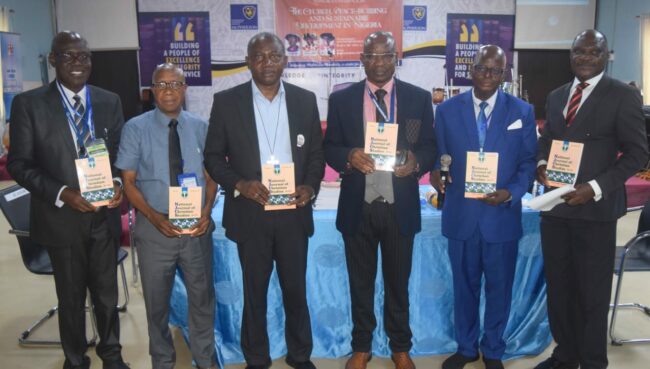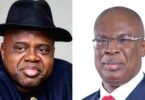Scholars of Christian studies have reiterated the role of the church and the clergy in peace-building and sustainable development in Nigeria and the world at large.
The scholars made this known, on Tuesday at the McPherson University in Ogun State, during the opening ceremony of the three-day 2023 annual conference of the National Association of Christian Studies (NACS) with the theme: ‘The church, peace-building and sustainable development in Nigeria’.
Professor Dapo Folorunso Asaju − the former Vice Chancellor of Ajayi Crowther University, the Lord Bishop of Ilesa Diocese, and the Bishop Theologian of the Anglican Church of Nigeria – in his keynote address titled ‘Peace-building and sustainable development in Nigeria: The role of the church’, lamented that many of the conflicts currently happening in the world have religious underpinnings.
Consequently, he said, “Theologians have the most important role to play if there must be peace-keeping and development that must be sustainable in any society. And that gives us the responsibility as scholars to be solution providers, not just eggs who will pontificate purists.”
Professor Asaju stated that as long as peace-building and sustainable development are concerned politicians are no longer in charge and are as confused as everyone. He said the politicians have power but do not know what to do with it.
“So, we are facing a deficit in leadership and people will have to look up to the church to offer solutions. Solutions can come from theologians. We are the custodians of peace and have the education to address any issue,” he said.
Concluding his lecture, Professor Asaju recommended a united Nigeria where peace, unity, and justice are guaranteed; maintenance of the secular status of Nigeria so that no religion will claim right over others; a society where people can freely live and express themselves, irrespective of their religions; a constitutional recognition of Christianity; change of education curriculum; among others.
“If we are asking for peace, let us also ask for harmony, justice, and the protection of the lives of the people. Let us shun religious extremism and allow people to practice their religion according to their scriptures,” Professor Asaju said.
The Vice Chancellor of McPherson University, Professor Francis Igbasan, stated that the theme of the conference was timely given the current conflicts, tensions, and wars facing Africa and the world, citing the ongoing Israel-Palestine war as an example.
The Vice-Chancellor stressed that the church has a vital role to play in the restoration of order and peace and that the church holds the ace in peace-building and sustainable development.
He further stated that Nigeria is a secular state and the government should not succumb to pressure from any country or international organisations to support wars or any act that will deny humanity peace.
“I am sure issues will emerge from this conference, new theories will be formulated, and strong incontrovertible facts will emerge. The communiqué from this conference should be loud and clear. It should serve as a policy guide for relevant government institutions and agencies,” the Vice Chancellor said.
The president of the organisation, Reverend Professor Afolorunso Dairo, emphasised that the theme of the conference is apt, considering the state of the nation in terms of security of lives and property.
Professor Dairo stated that Nigerians cannot be clamouring for development when there is no peace in the country.
In light of this, he added that collaboration is essential in achieving peace-building and sustainable development; and that no individual, organisation or initiative can on its own have a meaningful impact on issues of violence and peace.
“That is what brought these great scholars from all fields of academic endeavours to ruminate upon this issue which we hope to engage in and come up with a communiqué that will be forwarded to the government as our own contributions to peace-building in Nigeria,” Professor Dairo said.
The Dean of the College of Humanities, Social and Management Sciences, Dr Olubunmi Ajibade, emphasised that the role of religion should not be ignored when talking about sustainable development.
He added that all religions of the world recognise issues like poverty, injustice, insecurity, and other political and socio-economic problems.
Dr Ajibade lamented that Western scholars always look away from the role of religion in development and only see it as an obstacle that must be overcome for development to occur.
In light of this, he reiterated that scholars have a moral role to play in investigating injustice, and socio-political and economic problems in society.
“For Christianity to overcome or offer solutions to socio-political and economic problems there is a need to emphasise effective communication,” Dr Ajibade advised.
In the course of the event, two lead papers were presented.
The first presenter was the Provost of LIFE Theological Seminary, Lagos, Professor Cletus Orgu, and his paper was titled ‘Peace-building and sustainable development in Nigeria: The New Testament perspective’.
The second lead paper was presented by the Head of Department, Religion and Peace Studies, McPherson University, Dr Austin Omomia, and his paper was titled Religo-philosophical Pathway to Peace-building and sustainable development in Nigeria.
At the event, the NACS Journal − the National Journal of Christian Studies, Volume 6, Numbers 1 and 2 – was launched.
. TheWitness







